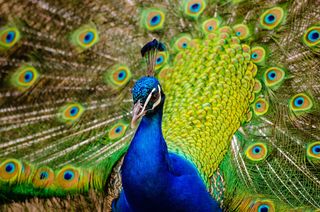Motivation
How a Purposeless Universe Became Infused with Purpose
How could purpose evolve in a random universe?
Posted August 4, 2018

Do you ever wonder where purpose comes from? How is purpose even a thing?
If you are a religious believer, the answer is easy: The universe was created by a purposeful higher power. Purpose came first, the universe came next, and then came living creatures, including us. Our sense of purpose is therefore derived from a creator, and dependent on the universe having a purpose.
If you subscribe to the scientific worldview, then the universe is fundamentally random and purposeless1. And yet, our little part of the universe – planet Earth – is infused with purpose. Where did purpose come from if the universe at its inception had none?
Purpose emerged with life itself. All living creatures are purpose-driven: all biological organisms, even the simplest, are by definition goal-directed – with or without any form of conscious intentionality as an outgrowth of this basic drive. Even a bacterium or a plant is goal-directed.
In the scientific worldview, the universe came first, without prior higher purpose – it arose spontaneously and unguided2. Then complex conglomerations of matter formed through self-organizing processes3. Later, at least on this planet and quite probably in many other places in the universe, complex organic assemblies of matter acquired living properties. Living creatures of astonishingly increasing complexity then evolved very slowly through fully natural processes4.
Life has been evolutionarily shaped by unguided environmental natural selection pressures5, around the goal of gene propagation. Organisms have evolved a wide variety of adaptations to grow and reproduce effectively.
In more complex animals, motivation underlies goal-directedness or purposefulness. Complex animals evolved additional motivating instincts (derived from fundamental survival and reproduction instincts). For example, mammals suckle their young, so surviving and thriving necessitates a very physically intimate bonding. Therefore, beginning with the mother-infant bond, attachment is an additional powerful motivating instinct and need in mammals. Emotions of all kinds are a very potent driver of motivation in mammals.
Social mammals such as primates have evolved to depend on group cohesion for their survival, so group acceptance, social role, and reputation within the group are a matter of survival and securing more resources, and are therefore important motivators.
Humans have the same basic biological survival, reproductive, and social needs as other primates, but our species has developed more multifaceted expressions of motivation and purposefulness as a result of our complex cognition and the dynamics of our large, intricate social groups. Humans have also evolved remarkable capacities for innovation and adaptation to different environments.
Sophisticated purpose-driven human behaviors are, fundamentally, merely elaborations of the evolved drive to survive and reproduce as vehicles for self-propagating genes. Even the highest forms of motivation can be understood as indirectly and unconsciously serving the primary biological drives, especially reproduction (impressing and attracting mates), and the secondary drives of enhancing social role and reputation (social accomplishments and being valued by the group). The magnificent displays of human civilization are thus the equivalent of peacock tails, extravagantly adorned by evolution. This realization needn’t demoralize us: the beauty of the peacock tail is not diminished by the fact that its purpose is merely to propagate mindless, ‘selfish’ peacock genes.
We are simply wired to be goal-directed, driven by our brain’s highly evolved motivation and reward circuits.
Pursuing and achieving goals is neurochemically reinforced and imbued with feelings of reward. Food and sex provide the most obvious rewards. More complex, creative, goal-directed behaviors provide more subtle rewards, such as feelings of accomplishment or self-actualization, but these are just complexly evolved elaborations of the same basic behavioral reinforcement system.
To be purpose-driven is to have an appetite for living. Our appetite for life is like our appetite for food – our love of food is not dependent on philosophical justifications, and our sophisticated appreciation of fine cuisine is not diminished by awareness that it is merely an embellishment of a biological survival instinct.
Motivation is the normal, natural state of animals, varying in intensity across individuals and partially modifiable by behavioral conditioning such as external rewards and consequences. Apathy and diminished capacity to experience feelings of reward are the abnormal, exceptional states, analogous to a loss of appetite. Many specific psychiatric/brain disorders cause a loss of ‘appetite for life’ or deficits in goal-directedness. Specific psychological and social factors can do this too, triggering depression due to feeling devalued or rejected – more so in biologically predisposed individuals.
People may attribute their depression to existential, philosophical factors such as a realization that the universe has no purpose, but this is usually an after-the-fact attribution for a depression predisposed and triggered by other factors. For most people, the realization that the universe has no inherent purpose is merely a question of intellectual interest, not something that profoundly alters our personal sense of purpose6.
We are hard-wired to be purposeful. We have evolved to be purpose driven, and it ultimately makes little difference to our innate motivation whether the universe has a purpose or not.
Remarkably, and yet fully plausibly through unmysterious processes, a random and purposeless universe produced pockets infused with purpose.
1. Religion and science are not in the slightest way compatible on this ultimate question.
2. Counterintuitively, there are plausible hypotheses addressing the conundrum of how something could come from nothing. Alternative hypotheses have our universe arising within a possibly eternal and infinite multiverse.
3. Yes, science can explain how this is possible, and no, it does not contravene the second law of thermodynamics.
4. It has taken modern science to help us see through the compelling illusion of intelligent design.
5. And quite often by sexual selection.
6. With the possible exception, in my clinical experience, of people from very religious communities in which the individual has been raised to believe that their personal sense of purpose is derived from and dependent on the universe having a purpose, and for whom a loss of their faith may additionally result in alienation from their family and community.




